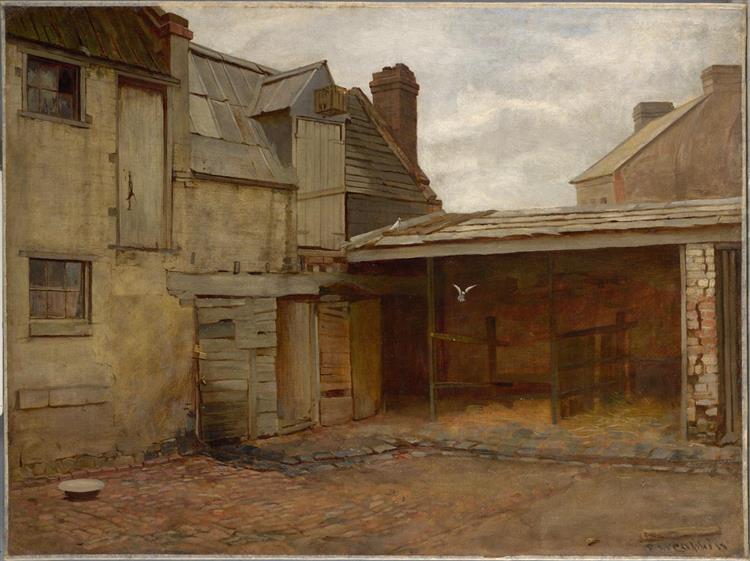Description
On the canvas entitled "Ancient stables - 1884" by Frederick McCubbin, we are faced with a manifestation of the Australian art of the nineteenth century that not only captures a specific moment in time, but also reflects the artist's mastery in the representation of life rural. McCubbin, a central figure in the Heidelberg school, offers in this work a scene that distills serenity and an endearing nostalgia for a bucolic past.
The composition of "ancient stables" is organized around a stable wood single, which occupies the central part of the painting. The structure, elementary and functional, unfolds in terrible and brown tones that talk about wood and time. The simplicity of this construction contrasts with the visual wealth of the natural environment that surrounds it. The inclined roof and its ancient walls evoke a humble but essential area of work, a testimony of perseverance and the tradition of the Australian field.
In the front, a human figure, possibly a farmer, is located with its back to the viewer, immersed in what seems to be a daily task. The presence of this character, although small and almost anecdotal, infuses life and a human connection to the stage. It is not found alone in the painting, There are other figures, apparently in collaboration or conversation dynamics, adding a sense of community and joint work.
The use of color by McCubbin is subtle but effective. Earth and grayish tones predominate in construction, but the prominence of the surrounding landscape provides a wider palette. The green of the vegetation surrounding the stable and the nuances of blue from the sky give the scene with almost poetic tranquility. In its light management, McCubbin uses soft lighting that highlights the material details of wood and landscape textures, creating an atmosphere of warmth and timelessness.
He painting It reflects influences of impressionism, particularly in the use of loose and diffuse brushstrokes that transmit movement and life to the scene. The connection with the nature and representation of natural light shows how McCubbin is inspired by its European contemporaries, although it adapts these influences to a purely Australian context.
We can consider "ancient stables - 1884" as a representative work of McCubbin's interests in documenting and celebrating the rural life of Australia. This interest is a recurring theme in his career, as evidenced in other works of his such as "Down on His Luck" and "The Pioneer", which also explore the struggle and relationship of man with the earth.
In sum, "old stables - 1884" is a piece that allows us to glimpse not only the technical skill of Frederick McCubbin, but also its deep commitment to the faithful and respectful representation of the landscape and the daily life of Australia. His ability to capture the essence of his subjects with emotional and visual precision has made McCubbin an indispensable figure in the history of Australian art, and this particular work, without a doubt, is a lasting testimony of his legacy.
KUADROS ©, a famous paint on your wall.
Hand-made oil painting reproductions, with the quality of professional artists and the distinctive seal of KUADROS ©.
Art reproduction service with satisfaction guarantee. If you are not completely satisfied with the replica of your painting, we refund your money 100%.

